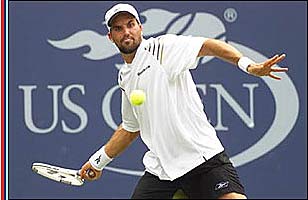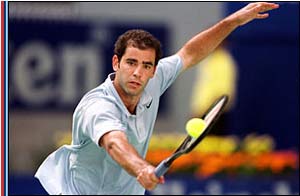<% ns_puts [mkm_getnavbar] %>
Muscle Memories
It's a pity that Pete Sampras has to play Pat Rafter in the fourth
round at this year's US Open. The match could go one of two ways. It might
be a classic battle or one of the combatants will blow the other away.
Interestingly, when two players having a long history between them meet,
memories come to mind, not just memories about past matches, but muscle
and neural memories also come to life to exert their influence on
performance, especially if previous matches were very important, tightly
contested, and emotionally significant.
significant.
Emotional memories are stored in an area of the brain called the amygdala. They are imprinted in networks of neurons and remain with us for a lifetime, oftentimes surfacing in times of stress or when encountering cues that remind us meaningful moments in our lives. Memories can also remain dormant but still affect us subconsciously.
|
In the case of tennis we often see players in slumps play incredible matches against top players they have frequently faced in the past despite losing to nobodies on other lesser occasions. Thus, even though Sampras has been in a "slump" for the last year or so he is more than capable of beating the hottest and best players in the game, especially if has played them frequently in the past. That is why an opponent like Sampras is so scary for Rafter who is having an incredible summer and very consistent overall year despite losing at Wimbledon and a few Master's series event finals.
In his courtside interview last night he wasn't displaying that Aussie modesty when he told Michael Barkum of USA network he did not want to face Pete, he meant it! His record against Sampras is 4-11 even though he won the last two encounters, but he is now facing a Sampras who is hyper-motivated to salvage a mediocre year.
The dynamic interaction among of muscle and neural memories and performance can be explained as follows:
Significant emotional memories (such as losing a tight or important match against Rafter in the past) coupled with an important occasion (a crucial early match at the US Open) can open a psycho-and-neurophysiological floodgate, activating neurotransmitters that help induce positive emotions and motivation and facilitate intensity levels, attention and vigilance. They also reduce doubt and fear, while increasing self-confidence. In concert, psycho-and neurophysiological processes can function to prime cognitive motor schemata (muscle memory templates) for action. If this occurs in Sampras, you can expect him to come out smoking and playing his best tennis from the get go.
|
Your best tennis (yes yours too!) is stored in neural memory templates or caches waiting to be released. The odds of them (your ideal performance templates) being put into action in a smooth and coherent manner increases linearly or in direct relationship to activation of important behavioral (motivation), psychological (attention), and psychophysiological (e.g., heart rate deceleration see previous article) response tendencies that are in part mediated by emotional memories stored in the brain (amygdala).
In the mentally tough elite athlete like Sampras, you can expect an emotionally significant and charged setting and situation (a match against rival Rafter who has beaten him on big occasions in the past) to bring out the best. Not only does Pete have a strong emotional memory imprint of Rafter matches, he also has a technical and tactical neural template specifically geared to playing him. He just has to implement it and this is increasingly likely as a function of the previously described emotional memory imprint and psychobiological mediators.
By contrast, Rafter is unlikely to currently have a stronger emotional imprint for Sampras than Pete has for Pat. Emotional memories fluctuate continuously as a function of previous and recent experiences and can degrade over time. Consequently, in Rafter's case, we may witness a player whose emotional memories concerning Sampras have been tempered, especially because of his last two victories over Pete. This may subtly reduce his ability to achieve maximum motivation prior to and in the early phases of the match. As a result he may come out slow and have to play catch up. The current psychological state of the Sampras-Rafter rivalry favors Sampras.
I think we can look for Pete to come out fast and take a big lead. He will then close out the match in a routine manner. On the other hand it is possible that being down early will release memories of previous battles in which Rafter came from behind to defeat Pete. Such could spur him on to victory, especially if Sampras has repressed memories about losing to Rafter after leading and these memories creep into consciousness in an intrusive and disrupting manner during critical moments of the match.
It'll all come down to MEMORIES, emotional and muscle (neural) memory.
Your comments are welcome. Let us know what you about think this article by emailing us here at TennisONE.
Dr. Roland A. Carlstedt has followed the professional
tennis tours since 1985, fulltime from 1989-1998 in which he on average
attended 25 tournaments a year including all Grand Slam events and
important Davis Cup ties. During this time he complied perhaps the most
extensive database in existence on the psychological performance,
tendencies, and profiles of most ATP and WTA players. His annual
Psychological World Rankings for Tennis have been published since 1991
more than 500 times in over 40 countries. His rankings and data are based
on his Psychological Observation System for Tennis. Interestingly his 2000
rankings which were released prior to the 2001 Australian Open had 2 of 4
semifinalists and 8 of 16 quarterfinalists on them including such unlikely
players as Arnaud Clement and Sebastian Grossjean. His 2001 rankings will
appear in TennisONE at the end of the year.
Last Updated 9/2/01. To contact us, please email to: webmaster@tennisone.com
TennisONE is a registered trademark of TennisONE and SportsWeb ONE; Copyright 1995. All rights reserved.


